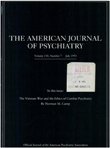Follow-up and family study of anxious depression
Abstract
OBJECTIVE: The failure of the concept of anxious depression to find its way into DSM-III-R led the authors to conclude that a further report on the occurrence of anxiety symptoms in depressed subjects is indicated. METHOD: The subjects were 327 consecutively evaluated inpatients and outpatients with primary unipolar depressive disorder at five university medical centers participating in the National Institute of Mental Health Collaborative Program on the Psychobiology of Depression-- Clinical Studies. The authors restricted their sample selection to patients with primary depressive disorder so that patients with other preexisting psychiatric disorders, especially anxiety disorders, would not contaminate the symptom picture, family studies, or follow-up. The examined six anxiety symptoms and derived a new anxiety summary score to show the effect of anxiety in depression on family data and 5-year outcome. RESULTS: Depressed subjects with higher ratings for anxiety took longer to recover. There was also a significant relationship between anxiety in depressed probands and the risk for primary unipolar depressive disorder, but not anxiety disorders or alcoholism, among 832 blindly interviewed first-degree relatives. CONCLUSIONS: These data confirm the usefulness of subdividing depressed patients according to anxiety symptoms: psychic and somatic symptoms of anxiety, taken together, significantly predict family illness and course. The data also emphasize the wisdom of requiring that generalized anxiety disorder not be diagnosed in the presence of a mood disorder. Clearly, symptoms of anxiety coexist with depression and need to be recognized for the effective treatment of the underlying depressive disorder.
Access content
To read the fulltext, please use one of the options below to sign in or purchase access.- Personal login
- Institutional Login
- Sign in via OpenAthens
- Register for access
-
Please login/register if you wish to pair your device and check access availability.
Not a subscriber?
PsychiatryOnline subscription options offer access to the DSM-5 library, books, journals, CME, and patient resources. This all-in-one virtual library provides psychiatrists and mental health professionals with key resources for diagnosis, treatment, research, and professional development.
Need more help? PsychiatryOnline Customer Service may be reached by emailing [email protected] or by calling 800-368-5777 (in the U.S.) or 703-907-7322 (outside the U.S.).



